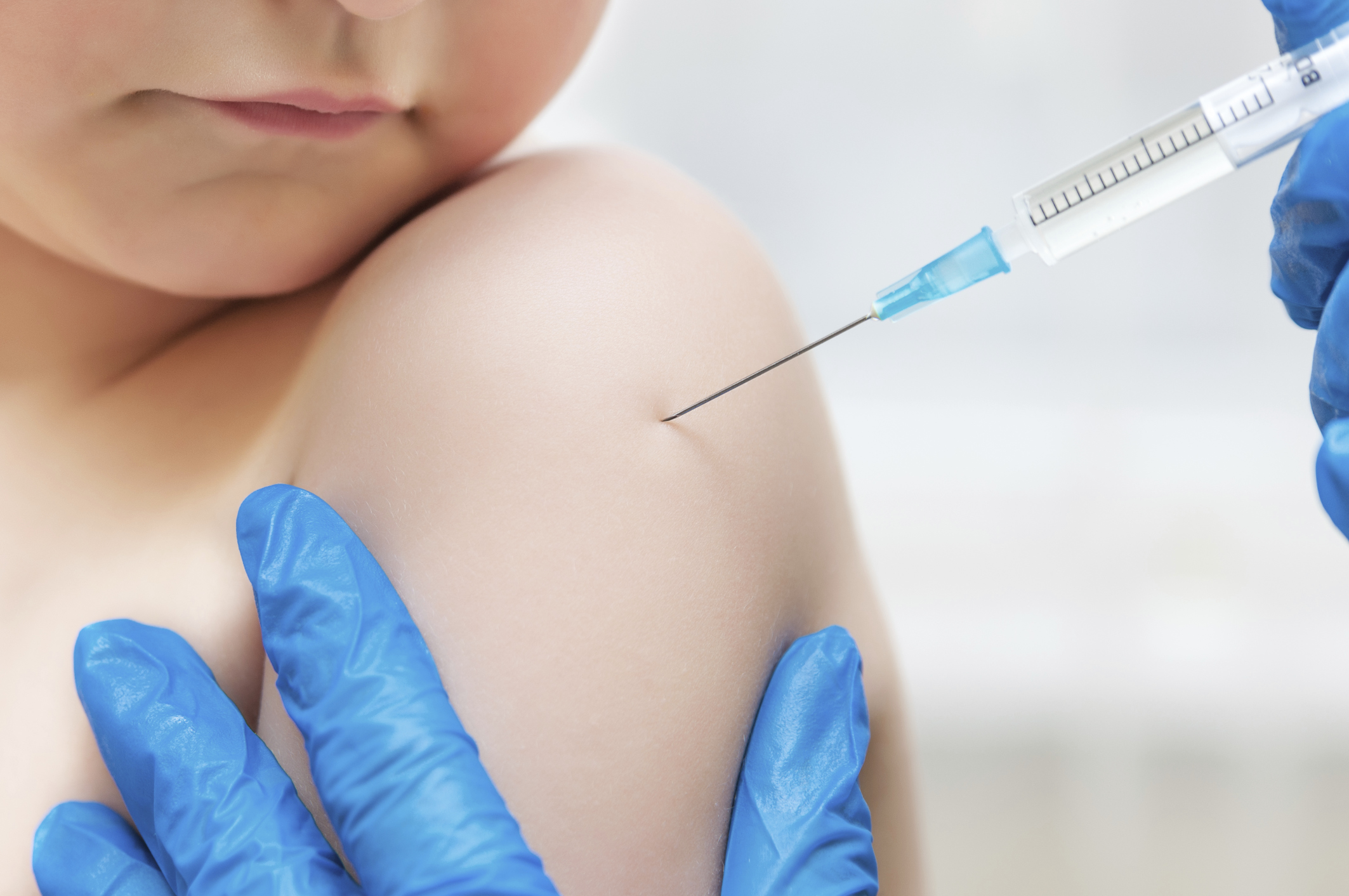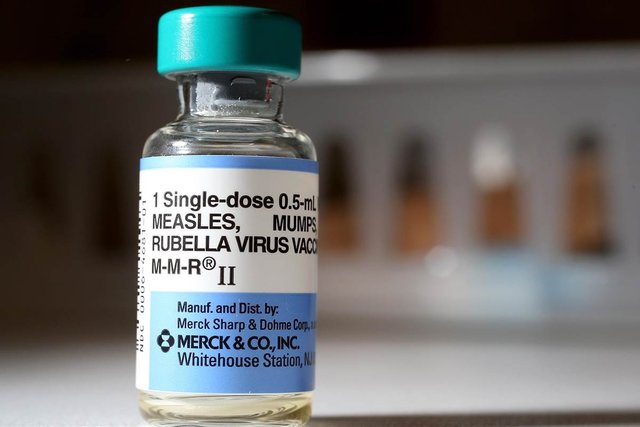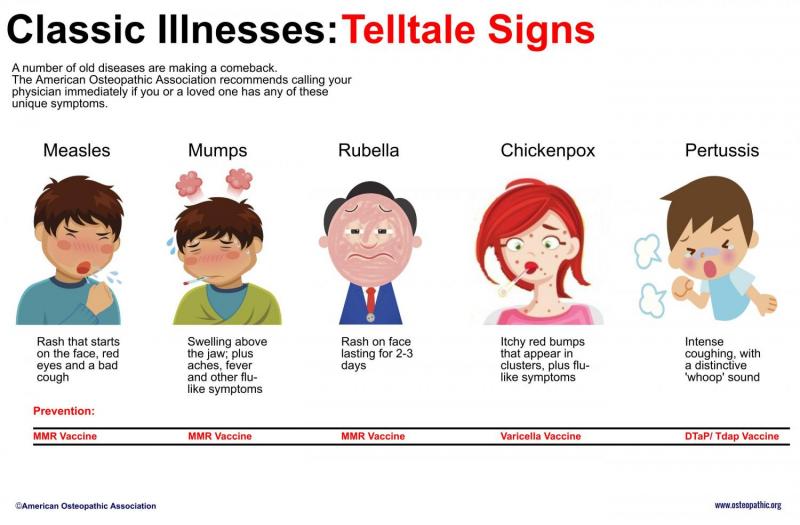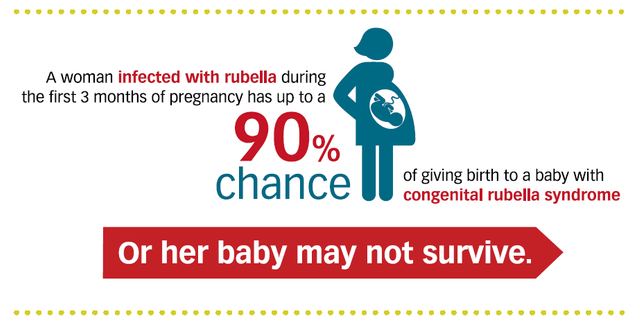A vaccine is a biological preparation that provides active acquired immunity to a particular disease. A vaccine typically contains an agent that resembles a disease-causing microorganism and is often made from weakened or killed forms of the microbe, its toxins or one of its surface proteins. Wikipedia
What is the MR vaccine? What is the difference with MMR vaccine?
MR vaccine is given to prevent the occurrence of diseases caused by measles virus (measles) and rubella (German measles). While MMR, is a vaccine to prevent the occurrence of infectious disease measles, mumps, and rubella.
So, even if the child has previously received the MMR vaccine, the child should still get the MR vaccine.
Impact and indication if MR virus strain?
Symptoms of measles begin with a high fever, the child looks severely ill, accompanied by a cough and runny nose, can be found vomiting and diarrhea. The next symptom is with the appearance of a red rash starting from the face then to the rest of the body. Then the eyes look reddish and watery, and dry lips.
In certain children when experiencing high fever is also accompanied by seizures. After the fever drops, the blot turns into a blackish brown and will disappear a few days to weeks afterwards.
This disease can cause complications in the lungs and brain. And not infrequently, pneumonia causes death. The virus is so contagious that it causes an outbreak.
Rubella symptoms begin with a mild fever, the child is seen mild illness followed by the appearance of a red rash that starts from the face and extends throughout the body. If touched on the back of the neck, there is enlarged lymph nodes.
Usually after 3 days the fever goes down without leaving a brown spot. Children recover quickly and appetite improves.
These viruses rarely cause complications. Complications actually arise when the virus attacks pregnant women. The fetus of the mother will experience severe symptoms.
If the virus attacks in the first trimester, can lead to miscarriage. When attacking a pregnant woman in the second trimester, the mother will give birth to a baby with a disorder called congenital rubella syndrome characterized by small head size, blind, deaf, and mentally disabled.
Does the impact differ for children and adults?
Measles virus usually attacks children. When attacking adults, usually the symptoms will be much heavier. While the rubella virus, both in children and adults, will only experience mild symptoms. Virus attacks will be more devastating if attacking a pregnant woman, whose negative effects a baby can be born with a disability.
Virus-induced disease can not be treated. That is, if the prospective mother attacked by rubella virus during pregnancy, all she can do is check her pregnancy to the doctor. Babies can be born normal if handled in the first half. It also needs extra handling.
Does an adult not need this vaccine?
Adults can also be given this vaccine, especially before becoming pregnant. For more info consult a doctor at a hospital, health center, or other health center. However, this national program of MR vaccines for children run by the government is free. If you are over 15 years of age and vaccine at other hospitals / health centers and outside of this national government program schedule, it will be charged according to what the hospital or health center applies to.
Why does the government feel the need to deliver the MR vaccine?
This virus causes death and disability in children almost all over the world. Measles caused by measles virus can cause serious complications in the child's body, including pneumonia, encephalitis, blindness, malnutrition, and death.
And most sadly, there is no treatment for this disease. So, to break the transmission of measles and rubella viruses, all we can do is to take precautions. That is with immunization of MR vaccine!
Who is this vaccine for
That is to children aged 9 months to <15 years, regardless of previous immunization status. That is, if the child has previously received immunization MMR (Mumps, Measles, Rubella), still must get the MR vaccine.
These activities are held in schools (kindergarten, elementary / junior high school, equivalent, junior high school / equivalent), posyandu, puskesmas, hospitals, and other health care facilities.
Is there any preparation before given the vaccine?
What children should do before vaccination is to eat, at least 30 minutes in advance. This is to make sure the child's body is well-nourished and fit.
Impact?
No impact means post vaccination. If your child's body has a mild fever, red rash, mild swelling at the injection site, do not panic. Physical reactions are common.
But if the fever continues and gets higher, convulsions, and large swelling at the injection site, immediately take the child to the nearest health care facility.
Has the vaccine been clinically tested?
Of course, yes. The vaccine used has received a recommendation from the World Health Organization (WHO) and marketing authorization from the POM. The 95% MR vaccine is safe and effective against measles and rubella, and has been used in more than 141 countries worldwide.
Come on, protect your baby from sickness, disability, and death caused by measles and rubella virus.
References:
http://www.parenting.co.id/balita/vaksin-mr-satu-vaksin-cegah-dua-penyakit
http://www.parenting.co.id/usia-sekolah/apa-itu-vaksin-mr-dan-apa-bedanya-dari-vaksin-mmr-






To be trusted is a greater compliment than to be loved. Hope you have a great day!
Downvoting a post can decrease pending rewards and make it less visible. Common reasons:
Submit
Sorry but I don't really get why you need this vaccine if you have already gotten vaccinated with the MMR. For these safety tests how long did they follow up on the test subjects? Were they actually looking for anything related to a adverse event past the general sore arm or did they actually consider the possibility of triggering autoimmunity?
Downvoting a post can decrease pending rewards and make it less visible. Common reasons:
Submit
MR is given again in lieu of a second administration of MMR, because MR is cheaper and protection against Measles and Rubella are very important.
Its not given in addition to, it's actually replacing a second administration of MMR.
In countries where two doses of MMR are given, then NO MR vaccine is administered as it is redundant.
Downvoting a post can decrease pending rewards and make it less visible. Common reasons:
Submit
MR vaccine is given to prevent occurrence of disease caused by virus measles and rubella (German measles). While MMR, is a vaccine to prevent occurrence of infectious diseases measles, mumps and rubella.
So, even if the child has previously received the MMR vaccine, the child should get the MR vaccine. it is safe, there is no double dose.
Downvoting a post can decrease pending rewards and make it less visible. Common reasons:
Submit